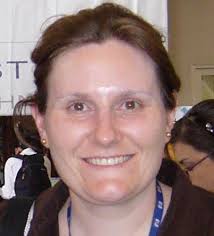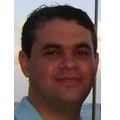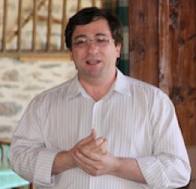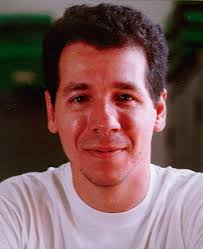WESAAC 2015 - Schools
WESAAC features a "School" track, which provides student delegates with a unique opportunity with a hands-on workshop to assess the current status of software agents and to indicate where the field is heading in the future. An international group of experts has been invited to tutor on different topics, to provide a broad and in-depth view of the application development of the field.
School 01: NetLogo - A Tool for Multiagent Simulation
Diana Francisca Adamatti (FURG), Brazil
 Diana Adamatti is a Professor of Artificial Intelligence in the Computer Science Center, Universidade Federal do Rio Grande (FURG), Brazil. She is a member of the WESAAC Advising Committee. She was a post-doctoral researcher at the Istituto di Scienze e Tecnologie della Cognizione (ISCT) of the Consiglio Nazionale delle Ricerche (CNR) in Rome, Italy, and she has been an active researcher in the brazilian agent community. Research fields of interest include Multiagent Systems, Social Simulation and Computational Games.
Diana Adamatti is a Professor of Artificial Intelligence in the Computer Science Center, Universidade Federal do Rio Grande (FURG), Brazil. She is a member of the WESAAC Advising Committee. She was a post-doctoral researcher at the Istituto di Scienze e Tecnologie della Cognizione (ISCT) of the Consiglio Nazionale delle Ricerche (CNR) in Rome, Italy, and she has been an active researcher in the brazilian agent community. Research fields of interest include Multiagent Systems, Social Simulation and Computational Games.
Abstract: This school will introduce NetLogo. NetLogo is a multiagent programmable modeling environment. It is used by tens of thousands of students, teachers and researchers worldwide. The school will provide an overview of NetLogo followed by a hands-on usage of the programming environment, to allow participants to verify NetLogo capacities using some MAS sample applications.
School 02: Using Intelligent Techniques to deal with Refactoring Activities
Baldoino Fonseca Neto (UFAL), Brasil
 Baldoino Fonseca Neto is an Associate Professor at UFAL, Brazil. He received his Ph.D. from PUC-Rio (Brazil) in 2012. He is in the organization team of WESAAC 2015 and he also organized another workshop on multi-agent systems (Workshop on Autonomous Software Systems - AutoSoft 2012). His research interests include Software Engineering for Multi-Agent Systems and Refactoring.
Baldoino Fonseca Neto is an Associate Professor at UFAL, Brazil. He received his Ph.D. from PUC-Rio (Brazil) in 2012. He is in the organization team of WESAAC 2015 and he also organized another workshop on multi-agent systems (Workshop on Autonomous Software Systems - AutoSoft 2012). His research interests include Software Engineering for Multi-Agent Systems and Refactoring.
Abstract: Software maintenance may degrade the software quality. One of the primary ways to reduce undesired effects of maintenance is Refactoring, which is a technique to improve software code quality without changing its observable behavior. To safely apply a refactoring, several issues must be considered: (i) identify the code parts that should be improved (such parts are known as code smells); (ii) determine the changes (or corrections) that must be applied to the code in order to improve its quality (e. g. reusability, flexibility, extendibility, effectiveness); (iii) evaluate the corrections impact on code quality; and (iv) check that the observable behavior of the software will be preserved after applying the corrections. Given the amount of issues to consider, refactoring by hand has been assumed to be an expensive and error-prone task. Therefore, in this school we will present existing intelligent techniques that can help developers to perform refactoring activities in an autonomous way.
School 03: Practical Multi-Agent Programming with JaCaMo
Rafael Heitor Bordini (PUCRS), Brazil
 Rafael Bordini is an Associate Professor at FACIN-PUCRS since March 2012. Previous to this appointment, I was an associate professor at INF-UFRGS (from July 2009) and previous to that I was a Lecturer in the Department of Computer Science, Durham University, UK (July 2004 to January 2009). I read for a PhD at UCL (finished in early 1999), then worked as a visiting lecturer at INF-UFRGS (until May 2002), and from June 2002 to May 2004 I was a post-doctoral researcher at the University of Liverpool. Research fields of interest include multi-agent programming languages, logics and formal methods in multi-agent systems, formal verification of multi-agent systems through model checking, state-space reduction techniques for model checking multi-agent systems, testing and debugging multi-agent programs and applications of autonomous system.
Rafael Bordini is an Associate Professor at FACIN-PUCRS since March 2012. Previous to this appointment, I was an associate professor at INF-UFRGS (from July 2009) and previous to that I was a Lecturer in the Department of Computer Science, Durham University, UK (July 2004 to January 2009). I read for a PhD at UCL (finished in early 1999), then worked as a visiting lecturer at INF-UFRGS (until May 2002), and from June 2002 to May 2004 I was a post-doctoral researcher at the University of Liverpool. Research fields of interest include multi-agent programming languages, logics and formal methods in multi-agent systems, formal verification of multi-agent systems through model checking, state-space reduction techniques for model checking multi-agent systems, testing and debugging multi-agent programs and applications of autonomous system.
Abstract: This course will briefly discuss CArtAgO and Jason, two of the main components, together with Moise, of the JaCaMo framework. Using the same case study as in the "Organisation-Oriented Programming with JaCaMo" course, we now see further how the agents can coordinate themselves with the help of organisational artifacts and how they can be programmed with Jason. There will be a lab session where students will be able to experience the practical use of the JaCaMo framework.
School 04: Organisation-Oriented Programming with JaCaMo
Jaime Simão Sichman (USP), Brazil
 Jaime Sichman is an Associate Professor at the Computer Engineering and Digital Systems Department (DCS) at University of São Paulo (USP). Along with several colleagues, he helped creating two fields of agent research: Multi-Agent-Based Simulation (MABS) e de Coordination, Organization, Institutions and Norms in Agent Systems (COIN), which led to two international workshop series since 1998. He organized several national and international workshops and conferences. In particular, he was Tutorial Chair of AAMAS 2007, one of the Program Co-Chairs of AAMAS 2009, and General Chair of WCSS 2014. Research fields of interest include social reasoning, organizations, agent-based simulation, agent reputation and trust, and system interoperability with agents.
Jaime Sichman is an Associate Professor at the Computer Engineering and Digital Systems Department (DCS) at University of São Paulo (USP). Along with several colleagues, he helped creating two fields of agent research: Multi-Agent-Based Simulation (MABS) e de Coordination, Organization, Institutions and Norms in Agent Systems (COIN), which led to two international workshop series since 1998. He organized several national and international workshops and conferences. In particular, he was Tutorial Chair of AAMAS 2007, one of the Program Co-Chairs of AAMAS 2009, and General Chair of WCSS 2014. Research fields of interest include social reasoning, organizations, agent-based simulation, agent reputation and trust, and system interoperability with agents.
Abstract: We present a comprehensive view of Multi-Agent Oriented Programming models based on existing platforms, languages and applications of multi-agent systems. In particular, we will discuss the different abstraction and first class entities that can be used as candidates for programming multi-agent systems. We intend to give some historical background to the programming of MAS. We also present an integrated scenario that will be used as case study for the rest of this tutorial. We then focus on the different approaches related to organisation-oriented programming in MAS, considering existing languages and platforms. Next, we pursue the practical design of the presented case study using the Moise organisational model, and we discuss how global organisational goals can be related, decomposed and distributed to agents in the context of the JaCaMo framework.